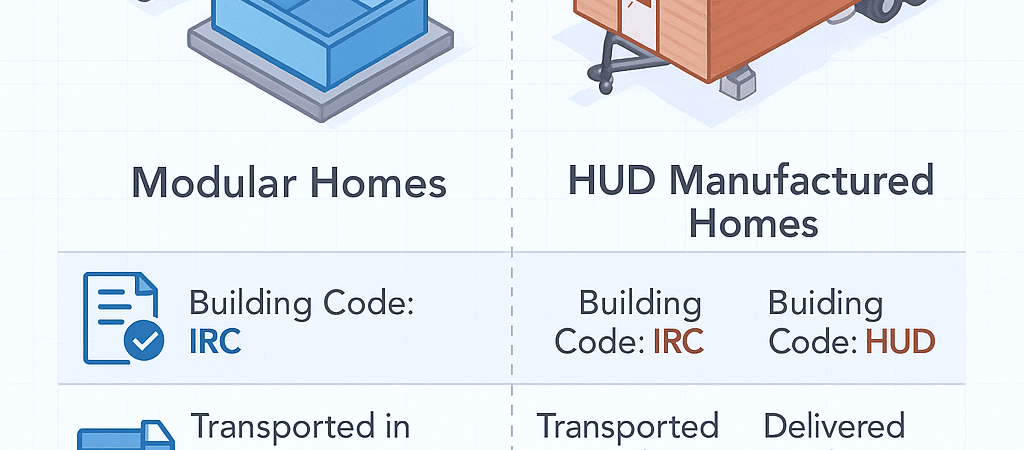If you’re researching mobile homes or manufactured homes, it’s critical to understand the distinctions—especially between modular and HUD-code built homes. The biggest difference? It all comes down to the building code used.
What Defines a Manufactured Home (HUD Code)?
A manufactured home (previously referred to—somewhat inaccurately—as a mobile home) is built under the strict national guidelines of the HUD Code, enforced by the U.S. Department of Housing and Urban Development. Homes constructed this way must follow federal safety, energy, and construction standards set in place since June 15, 1976 (Wikipedia, oakcreekhomes.com, Excelsior Homes West, Inc.).
These homes are built in a factory on a steel chassis, transported—often in sections—to the site, and installed either on a temporary or permanent foundation (Wikipedia, NerdWallet). They’re usually described by terms like single-wide, double-wide, or triple-wide.
What Defines a Modular Home (State & Local Codes)?
A modular home is also factory-built in multiple sections but must adhere to local and state building codes—the same ones that traditional, site-built homes follow (like the International Residential Code, or IRC) (Rocket Mortgage, Clayton Homes, Excelsior Homes West, Inc.).
Once assembled on-site on a permanent foundation, a modular home is treated identically to site-built homes—often appreciated in value and financed like conventional homes (Rocket Mortgage, Architectural Digest, NerdWallet).
Summary: Modular vs. Manufactured – At a Glance
| Home Type | Building Code | Foundation | Mobility | Appreciation |
|---|---|---|---|---|
| Manufactured (HUD) | Federal HUD Code | Chassis-based; variable | Mobile | Can appreciate and/or depreciate. |
| Modular | Local/State Codes (IRC) | Permanent foundation | Not mobile | Appreciates like site-built homes |
Why “Manufactured Home” Isn’t the Same as “Mobile Home”
Though many still use mobile home colloquially, it’s outdated—legal homes built today fall under the term manufactured home if they adhere to HUD standards (Wikipedia, oakcreekhomes.com). And calling all factory-built homes “manufactured homes” is overly broad. Modular homes are a distinct category defined by different building standards.
Why It Matters
- Accuracy in conversation: Professionals who lump modular homes in with manufactured can sound uninformed—and it may confuse buyers about financing, zoning, and resale value.
- Financing differences: Modular homes qualify for traditional mortgages; manufactured homes may require chattel loans or specific FHA/VA financing (Investopedia).
- Home value and permanence: A modular structure looks and performs like a site-built home. A manufactured home—with its chassis—may be challenged by the “mobile home” stigma regarding long-term value or stability.
Final Thoughts
Yes, both modular and manufactured homes are factory-built, but the building code is the defining difference. Knowing the distinction ensures smarter decisions in financing, design, and resale. And using the right terms—modular vs. manufactured home—not only empowers you, but also positions you as a savvy, informed buyer or seller.
About Chris Sells South Carolina
At Chris Sells South Carolina, we believe clarity matters. Whether you’re exploring modular, manufactured, or trade-in options, we’re here to guide you with accurate, up-to-date information. Reach out to us to learn more or begin your home buying process—smartly and confidently.
Join Our Community:
This isn’t just a blog—it’s a growing network of homeowners, future buyers, and industry enthusiasts!
Follow us and stay updated:
- Facebook: Chris Sells South Carolina
- Instagram: https://www.instagram.com/chrissellssouthcarolina/
- YouTube: https://www.youtube.com/@ChrisSellsSC
- TikTok: https://www.tiktok.com/@chrissellssc?is_from_webapp=1&sender_device=pc
Be the first to know: Sign up for our email list to receive the latest blog posts, insightful resources, and exclusive updates as our site and community grow.
Whether you’re purchasing your first home, exploring low‑cost homeownership, or curious about modern manufactured home communities, you’re in the right place. Let’s explore affordable, energy-efficient housing together—welcome aboard!
– The Chris Sells South Carolina Team
